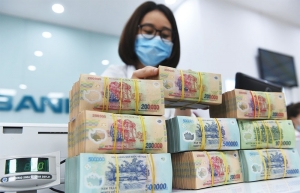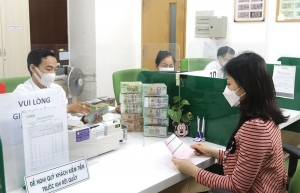Lenders adjust as real estate giants revive ventures
As of April 25, the credit debt for the real estate industry has experienced a notable increase of 3.51 per cent compared to the end of 2022, according to the State Bank of Vietnam (SBV). This growth surpasses the overall credit expansion rate of the entire banking system, which stands at 2.75 per cent.
 |
| Lenders adjust as real estate giants revive ventures, illustration photo |
One key aspect that has posed significant challenges in the realm of real estate lending, as highlighted by chairman of BIDV’s Board of Directors, Phan Duc Tu, is the complex web of legal issues surrounding the market. Recently, these legal complexities have been the primary impediment to smooth operations and sustained growth in the sector.
At BIDV’s AGM last month, Tu stated that BIDV has conducted extensive consultations with 15 prominent developers, revealing that more than 70 per cent encountered difficulties attributed to legal intricacies. “Even hindrances concerning capital within the banking system are intricately intertwined with prevailing legal concerns,” Tu said.
Currently, loans related to real estate ventures account for approximately 2 per cent of BIDV’s total outstanding debt, while loans directed towards aspiring homeowners constitute a considerable 15 per cent.
Tu noted that BIDV’s selection process for funding allocation is meticulous and strategic. “We prioritise real estate enterprises that possess impeccable legal credentials, exhibit robust project execution capabilities, and boast a strong presence in the market. Such stringent criteria serve as the bedrock for the bank’s decision-making process when considering loan disbursement,” he said.
Luu Trung Thai, chairman of MB’s Board of Directors, highlights that the challenges faced by enterprises such as Novaland and Hung Thinh are not exclusive to the real estate industry but pervade the entire sector. “The most significant current issue lies in legal obstacles rather than financial constraints,” Thai stated.
Novaland is poised to revive several ventures. Last week, it held a signing event for implementation of the NovaWorld Ho Tram project, encompassing the Habana Island and Wonderland phases.
Last week it also embarked on the reactivation of NovaWorld Phan Thiet and arranged a sponsor signing ceremony with its credit partner, MB Bank.
MB, along with numerous other financial institutions, has reinstated the disbursement of funds to support Novaland’s projects following a prolonged hiatus prompted by concerns over the conglomerate’s financial standing.
Elsewhere, Ho Hung Anh, chairman of Techcombank’s Board of Directors, acknowledged the bank’s relatively high proportion of real estate lending. However, he clarified that this primarily consists of loans extended to individuals seeking to purchase homes.
“The bank selectively chooses reputable clients and projects with complete legal compliance to ensure that, despite the challenging market conditions, these projects continue to be implemented.”
Meanwhile, at TPBank’s AGM, shareholders queried the leadership regarding a recent credit agreement with Novaland’s project, The Grand Manhattan, located in District 1 of Ho Chi Minh City. According to the agreement, TPBank provided financial support to ensure the project’s continued construction after a temporary halt, as well as offering credit facilities to homebuyers.
The bank’s CEO, Nguyen Hung, explained that this particular project is among seven initiatives in Ho Chi Minh City that are currently focused on resolving legal complications.
“This is the only project so far that has cleared its legal hurdles,” Hung asserted. The bank’s CEO stated that even if the project’s value decreases to the maximum extent due to market conditions, the involved parties remain fully capable of repaying their debts.
Hung further emphasised that TPBank continues to provide financial support to construction contractors and project completion. “There is still a significant amount of money owed by homebuyers from previous transactions, ensuring substantial repayment to the bank,” he said.
Meanwhile, around 60 per cent of corporate bonds that VPBank has invested in are intricately tied to real estate businesses.
“VPBank has actively engaged in financing endeavours, extending its support to more than 40 real estate projects helmed by prominent entities such as Sun Group, Vingroup, Novaland, and Dat Xanh,” said the bank’s CEO Nguyen Duc Vinh.
The bank’s commitment to prudent risk management is exemplified by the fact that no individual client accounts for more than 1 per cent of the bank’s aggregate debt. In the case of Novaland, VPBank currently oversees the funds of customers who have purchased properties from Novaland and collaborates with relevant authorities to alleviate difficulties faced by the corporation.
“We are not burdened by the spectre of non-performing loans (NPLs), as our collateralised assets and robust risk provisions empower us to effectively manage such challenges,” said Vinh.
The latest report by VNDirect Securities indicated that Q1 2023 has revealed emerging challenges in the banking sector’s financial performance. In the context of slowing credit expansion, commercial banks with a significant proportion of loans to large corporate customers, such as HDBank, Techcombank, VPBank, and TPBank, have exhibited better-than-average credit growth.
Conversely, banks’ lending to individuals has experienced a decrease or slower growth in credit, as observed in the cases of ACB, VIB, and Sacombank, compared to the start of the year.
According to the SBV, the NPL ratio for the entire banking sector increased to 2.9 per cent by the end of Q1, compared to 2 per cent at the end of 2022. Most banks have reported an increase in NPLs and a decrease in credit risk provision ratios compared to the previous quarter.
 | Lenders manifest steady trajectory with profit figures Although first quarter business results of banks show deceleration compared to the final quarter of 2022, in the current macro context, this still is an encouraging growth. |
 | Lenders to benefit in SBV debt reposition The State Bank of Vietnam’s fresh set of policies are anticipated to ameliorate the financial strain faced by both creditors and debtors, as well as establish a robust legal framework for debt restructuring to be allocated over a two-year period. |
What the stars mean:
★ Poor ★ ★ Promising ★★★ Good ★★★★ Very good ★★★★★ Exceptional
Related Contents
Latest News
More News
- Private capital funds as cornerstone of IFC plans (February 20, 2026 | 14:38)
- Priorities for building credibility and momentum within Vietnamese IFCs (February 20, 2026 | 14:29)
- How Hong Kong can bridge critical financial centre gaps (February 20, 2026 | 14:22)
- All global experiences useful for Vietnam’s international financial hub (February 20, 2026 | 14:16)
- Raised ties reaffirm strategic trust (February 20, 2026 | 14:06)
- Sustained growth can translate into income gains (February 19, 2026 | 18:55)
- The vision to maintain a stable monetary policy (February 19, 2026 | 08:50)
- Banking sector faces data governance hurdles in AI transition (February 19, 2026 | 08:00)
- AI leading to shift in banking roles (February 18, 2026 | 19:54)
- Digital banking enters season of transformation (February 16, 2026 | 09:00)

 Tag:
Tag:



















 Mobile Version
Mobile Version